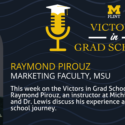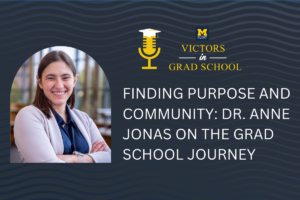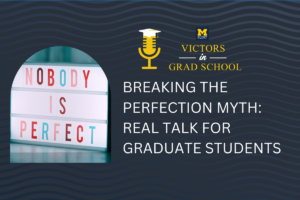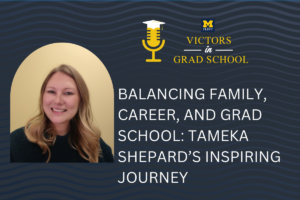The decision to pursue graduate education is a significant milestone for many individuals. It marks a new chapter of learning, growth, and personal development. In a recent podcast episode of “Victors in Grad School,” hosted by Dr. Christopher Lewis, Raymond Pirouz, an instructor at Michigan State University, shared his experiences and insights on his graduate school journey. From his motivation to pursue an MBA to the challenges and rewards of returning to academics after years of professional experience, Pirouz provided valuable perspectives for anyone considering or currently engaged in graduate education.
Making the Decision to Pursue Graduate Education
Pirouz reflected on the timing of his decision to pursue a graduate degree, highlighting how life events and professional commitments often detour initial plans. Despite the delay, he emphasized the importance of recognizing one’s readiness and finding the right moment to invest in oneself. His journey underscores the idea that graduate education should be seen as a gift to oneself—a pathway to personal enrichment and growth.
Choosing the Right Program and University
As someone with a background in graphic design and marketing, Pirouz explained his inclination towards business education, viewing the MBA program as a natural progression to align with his career interests. When selecting the University of Michigan Flint for his MBA, Pirouz prioritized flexibility and found personal significance in contributing to the Flint community. This insight demonstrates the value of considering not only academic factors but also personal and community-related elements when choosing a graduate program.
Balancing Graduate School with Professional and Personal Commitments
Transitioning back into a student role after years of teaching, Pirouz acknowledged the need for discipline, time management, and relationship building. Drawing from his teaching experience, he identified the importance of setting and pursuing goals, strategic commitment, and the nurturing of meaningful connections with faculty and peers. His experience provides a practical understanding of how individuals can navigate the dual responsibilities of graduate school and personal/professional obligations.
Applying Learnings from Graduate School
Upon completing his MBA, Pirouz seamlessly integrated his newly acquired knowledge into his teaching. He emphasized that the value of a graduate degree lies not in discrete activities or lessons but in the overall growth and development it fosters. The capacity to manage group dynamics, deadlines, and complex challenges during his studies has now become inherent in his professional work, reflecting the real-world applicability of graduate education.
Mentoring Future Graduate Students
As a mentor, Pirouz shares his insights with future graduate students, highlighting the increasing competitiveness of the workforce and the role of a graduate degree in professional advancement. He encourages prospective students to consider gaining work experience before pursuing graduate education, emphasizing the benefits of a mature perspective in the academic environment.
Embracing the Graduate School Experience
Pirouz’s unique perspective as a returning adult entering a student cohort with varying levels of professional experience sheds light on the diverse dynamics of graduate education. His approach to group activities, management challenges, and self-determination within the educational experience encapsulates the essence of embracing learning as a personal journey of empowerment and growth.
Conclusion
Raymond Pirouz’s journey through graduate school and subsequent application of his learnings reflect the holistic impact of higher education on personal and professional development. His insights offer a roadmap for individuals embarking on their own graduate journeys, reminding us that the pursuit of knowledge and growth is not confined to the classroom but extends to how we navigate, engage with, and contribute to the world around us. In conclusion, Raymond Pirouz’s valuable insights serve as a guide for individuals navigating the multifaceted landscape of graduate education, offering guidance, encouragement, and wisdom for anyone seeking to embark on, or currently engaged in their own graduate school journey.
TRANSCRIPT
TRANSCRIPT
Dr. Christopher Lewis [00:00:01]:
Welcome to the Victor’s in Grad School, where we have conversations with students, alumni, and experts about what it takes to find success in graduate school.
Dr. Christopher Lewis [00:00:11]:
Welcome back to Victors in Grad School. I’m your host doctor Christopher Lewis, director of Graduate programs at the University of Michigan Flint, really excited to have you back again this week. Every week, I love being able to sit down, talk to you, To work with you on this journey that you’re on. And it is a journey because I know that you might just be at that Beginning stages as you’re thinking about, do I really wanna do this? Do I want to step into graduate school? You may be in graduate school or have already applied to graduate Cool. And now you’re getting ready to start or you’re in graduate school and you’re working toward that light at the end of the tunnel. No matter where you’re at, There are things that you can do to be successful in graduate school, and that’s what this podcast is all about. It’s all about helping you to learn from others, to Help you to give you the skills that you need to be able to think about the future and your future success. I love being able to walk with you on this path because there are things that you can do now and in the future to prepare yourself well for that.
Dr. Christopher Lewis [00:01:16]:
And that’s why every week I also love having different guests on the show that have gone before you, that have experienced graduate school, Have done graduate school and can share that experience with you as well. This week, we’ve got another great guest. Raymond Peruzz is with us, and Raymond is an instructor at Michigan State University, Teaches a number of different classes at the undergraduate level, the MBA level, the executive MBA level, And even some specific courses that are very targeted. And he did his graduate work at the University of Michigan Flint getting his MBA in the past. I’m really excited to have him here today to talk to you about his experience. Raymond, thanks so much for being here today.
Raymond Pirouz [00:02:06]:
Well, thank you so much for having me. It’s my pleasure.
Dr. Christopher Lewis [00:02:08]:
It is my pleasure having you here today. Love being able to talk to you and learn from your experience. 1st and foremost, I wanna turn the clock back, and I know that you did your undergraduate work at the Art Center College of Design, you got a BFA there. And then from there, you went on, you had a number of other opportunities, experiences working. And at some point during all of those experiences that you had, you made a decision made a decision that you wanted to continue your education and get Your MBA. And so let’s go back in time and talk to me about what was going through your head as you’re going through those work experiences is that led you to deciding that you wanted to go back and get that graduate degree?
Raymond Pirouz [00:02:51]:
Well, I mean, it’s a good question because my goal was to get my graduate degree Pretty much right after my undergrad degree. However, as they as the saying goes, life gets in the way. Right? Work gets in the way, relationships, what have you. All kinds of things happen that for one reason or another may become blocks to your being able to achieve those objectives you may have set for yourself earlier. So at some point, 25 or so years after receiving my undergrad, I finally decided that, you know, it’s now is the time. I’m not getting any younger, and I really wasn’t a position where I do that for myself. So, I mean, I I did see it as, like, a gift to myself, and that is really what it is. I mean, at the end of the day, education, if you think about, you know, if you just think more broadly about why we’re here.
Raymond Pirouz [00:03:36]:
Who knows. Right? Who knows why we’re here on this planet. However, the one thing that I do know is that flesh and blood, I am for real, and the one thing I could do is to Elevate myself and make myself the best version of myself, and that is an investment in myself. So at some point, I decided, you know I’m finally in a position where I can take the time. Kids were grown, had more time, had made some investments, and had the opportunity to then be able to dedicate and, you know, treat myself to a graduate degree to take myself to the next level.
Dr. Christopher Lewis [00:04:05]:
So in giving yourself that gift that you decided to get that Masters in business administration. Talk to me about why an MBA. What was it about an MBA that made you decide that that was the route that you wanted to go? And 2, You probably had a lot of different options. You could have gone to a lot of different schools. You ended up choosing to attend the University of Michigan Flint. Talk to me about why The University of Michigan, Flint was the choice for you.
Raymond Pirouz [00:04:30]:
Yeah. Well, why MBA? So as you mentioned, you know, my undergrad was in graphic design from the ArtCenter College of Design. I started my career in advertising. And, obviously, I worked many years after that, and I ended up My professional career allowed my last role as director of marketing. So I did progress in my career organically. However, From the beginning, I had an interest in business. So even when I was in a design student, my interest was in the impact that design could have on business. So I wasn’t as interested as my peers were in terms of the aesthetic value of design for design sake.
Raymond Pirouz [00:05:05]:
I was far more interested in the commercial aspect, the commercial implications, the commercial impact. And so that kind of actually kinda made me an outcast in the United School, Believe it or not. Right? So I was like a troublemaker. People didn’t like that orientation, but that’s the orientation I had. And so I knew that I naturally felt more comfortable. Especially when I talk to other people who were business people, I just felt more comfortable in that space. And so I knew that that’s what I wanted to pursue, and that made the most sense To me, it was the perfect fit for me. As they say, you know, you gotta find that perfect fit.
Raymond Pirouz [00:05:37]:
For some, it’s a journey. For me, it was a journey to find who I am, what I respond to, what I like, what works for me, And the MBA was just perfect. Obviously, MBA in marketing, not MBA in finance or accounting. So, yes, I knew what role I I would pursue with within the MBA as an area of focus, of course. Why UN Flint? So strategically, I was looking for a program that would work with my schedule. I was busy doing everything that I was doing, so it needed to be flexible. So flexibility was the number one reason I chose UNFlint. The other, I think, variable is that for whatever reason, just Flint to me just is interesting.
Raymond Pirouz [00:06:13]:
It’s like for me to be involved In anything having to do with that part of the world, in a way, I mean, I don’t know. It feels like I’m giving back or made a contribution to that community, and I wanted to support that community. So that’s another reason why I thought Flint was a good choice. So flexibility and somehow being involved With that brand and, you know, giving back to that community. I I knew that, you know, by involving myself and going to that school, I met going to that community, eating lunch there, Stinging hotels there, supporting that community. So that was important to me.
Dr. Christopher Lewis [00:06:43]:
Now as you said, for you, it was 25 Years after your undergrad that you decided to go get that graduate degree, you’d been teaching in the past, But being a student again, there is a transition that you have to go into. Now you were able to find success In that graduate school experience for yourself, but what did you have to do to set yourself up for success as you transition back into being a student. And what did you have to do to maintain that success as you were balancing all of the other things that you were doing throughout that graduate school experience?
Raymond Pirouz [00:07:21]:
Yeah. So it’s a good point that I have been teaching for over 25 years now. I started teaching right after my undergrad. I’ve just Always been fascinated with the idea of taking complicated information, packaging it, and delivering it to other people to help them lead their lives, right, to become successful themselves. So I always loved that. As I was doing that, obviously, I learned by observing what makes a good student. What are some of the behaviors of the better students in class? So I learned from that actually, and you learn a lot from the people that you’re in the room with and whether or not you’re a student or a faculty member, if you’re paying attention. So I’m the kind of person who does pay attention.
Raymond Pirouz [00:07:54]:
And so I learned from that. But I also I mean, obviously, The, as you grow up, you learn what works and what doesn’t work in life. I knew that being disciplined and being able to set aside and make a commitment to an effort for it to be successful was the only way for it to become a success. And so you have to be very goal oriented, very strategic, very thoughtful in your approach, so I knew that I had to dedicate. And that’s why it Took me a while to be able to put myself in a position to be able to treat myself. I didn’t wanna do it and be a failure at it. I wanted to be a success, so I knew that it was gonna take a a Tremendous amount of effort that was going to take some dedication and a lot of discipline to be able to set aside the time. When you have a family, you know, you’re gonna have to Set aside your week and make sure that you have certain number of hours that you dedicate to 1 task versus another.
Raymond Pirouz [00:08:37]:
I was in a position to be able to dedicate a certain number of hours to study and doing a good job. The other thing I learned obviously throughout my professional career and and working and teaching was that relationships were very important. And I knew that I needed to be very good at building and nurturing the relationships that I would have with not just faculty members, but also with my peers in the program. And I knew that being able to do that would lead me to to a more successful overall experience. And and, obviously, I set forth with the intention of doing that as well.
Dr. Christopher Lewis [00:09:07]:
Now you had many years of experience. You’ve been a teacher. You have worked with Students in your own classrooms. You finished this masters of business administration. You continue to teach. How How do you see yourself incorporating what you learned throughout your degree into the work that you do every day?
Raymond Pirouz [00:09:27]:
I do it every day. You know? So for me, the master’s degree was just the next step of my personal evolution. Right? The the idea of self Factualization, the idea of making yourself your best self. So I can’t say that very specifically this one activity I do is directly related to the degree. That’s not the way it works. The way it works is that the degree makes you a more well rounded, a more whole, better version of yourself. You started as version 1.0, and then with the graduate degree, now you’re version 3.0. You know what I mean? So, overall, you’re going to be Far more accomplished individual who’s able to overcome adversity even that much better because the MBA program or any graduate program for the most part is going to consist of endless amounts of group activity, teamwork, deadlines that you have to meet.
Raymond Pirouz [00:10:17]:
And the way I interpret these experiences was that they are preparing you to be A more thoughtful and more accomplished and more successful professional, because that is what the real world is about. It’s about deadlines. It’s about working with other people. So if you can manage that process successfully throughout the MBA program, in this case, and or any other graduate program, which probably, you know, is structure similarly. You’re gonna do a lot better in the professional world after this experience. It is only gonna make you better.
Dr. Christopher Lewis [00:10:44]:
Now you have a kind of a unique Perspective. Because you teach students at the undergraduate, the graduate level, and you’ve gone through that graduate degree yourself, I’m sure that you mentor many students Along the way, as students come to you in your classes or you interact with students on the campus, what are some tips that you might offer to anyone That is considering graduate education that would help them find success in that journey.
Raymond Pirouz [00:11:10]:
I mean, what I tell people Is that nowadays, the world is so competitive, so hypercompetitive that an undergrad is simply just no longer enough to push yourself to the next level. So that’s a very practical way to think about it in terms of your overall effort to progress in life and in business And up the corporate ladder, if you will. So that’s one way to think about it. Obviously, there’s a practical implication and impact to obtaining a graduate degree. The other thing I’d say is that the The experiences that you get in an undergrad, the context of it is like a deer in the headlights. And when you’re young, you don’t know what you don’t know yet. As you get older and as you have more experience, you’ll learn a lot more about how the world works. And then it’s a good idea to then expose yourself To the thinking that’s offered in a graduate program that is largely abstract, but the abstraction of it is important because it takes complex Realities of the world and then packages it in abstract representations of these complexities so that you can unpack it And compare it to the experiences that you’ve had.
Raymond Pirouz [00:12:15]:
So which I always also tell people, it’s not actually a good idea to pursue a graduate degree right after you’re undergrad. It is a good idea to go out there And explore and experience some of what the world has to offer and then go back to a graduate degree. My feeling is that you get a lot more out of it, especially when you’re Older, I feel you’re a lot more serious about the educational experience can be. A lot more serious about what the educational experience is really all about, And you’ll appreciate it a lot more. Adult learners seem to make more of their experience in an educational setting than younger folks For various reasons. So I think it’s just a part of a natural evolution of a person that wants to take themselves to the next level.
Dr. Christopher Lewis [00:12:53]:
Sage Advice, I really appreciate you sharing that, Raymond, and I really appreciate you really delving into the experience that you’ve had In how you’re utilizing that, I mean, it seems as you said, I mean, you’re using it on a daily basis because you’re teaching it again. And I love the the concept though of Looking at this as an evolution, one thing that I probably should have asked earlier that I think would be interesting is as you said at the very beginning, One of the things that you had thought about was that you were going to go to graduate school right after undergrad. And going right From undergrad to grad, you are in a very different space. And as you said, you don’t know what you don’t know. You took The time you had work experience and then came back to the classroom. As a returning adult going into graduate school And being in a mix of students that are students that have work experience or that come right from undergrad, What was that experience like for you, and how did you manage that situation for yourself?
Raymond Pirouz [00:13:58]:
It was actually a really fun experience. I mean, truth be told, I was Probably the oldest person or one of the oldest people at the program when I was in it. I’m 55 now, and I must have just turned 50 or something like that. It was crazy. But, Ashley was a lot of fun because, like I said, there are so many group activities, and every time like, so I saw it as fun. Every time there was a new group activity. You know, some people would say, oh, here we go, another group or, you know, another group project. But I would say, wow.
Raymond Pirouz [00:14:24]:
You know, another opportunity to see how this one’s gonna go because the challenge is in obviously building rapport with complete strangers, getting to know them, trying to determine How the group’s going to work if it’s going to work? Are the people responsive? Do the other people in your group seem to be taking the weight of this opportunity as seriously as you’re taking it so that you can have a fruitful, meaningful interaction. There are some people that are more checked out than others. So there is a dynamic at play every time a new group is formed. And that to me is a huge challenge. That’s, like, the biggest challenge is to establish the group, get the group norms functioning properly so that you can have a meaningful interaction so you can come up with exceptional work. And that at the end of the day, Again, it’s very realistic because that’s how the real world works. You’re gonna be working with actual people. Not all of them are gonna wanna be doing what you’re tasked to do.
Raymond Pirouz [00:15:17]:
And so the challenge is to get everyone around the fire and make sure everyone is happy and has what they need and is able to do the best work that they can deliver. And that is a huge management challenge. So if you think about, you know, micro experiences of management challenges of dealing with people, the MBA program is a great laboratory for that, for building management thinking. Again, if you see it like this so I I always tell my students, you’re gonna get out of this class what you put into it. Easy to say, Hard to understand or appreciate. You’re only gonna get out of the program what you put into it. You can go in to the program, the entire program, and end up saying, I got nothing out of this program. I don’t know what this was all about.
Raymond Pirouz [00:15:56]:
That would be a horrible way to go through any program, but there are many people who go through Classes and programs like that. Alright? Or you can go through the program and say, this is what I want out of the program. This is why I’m doing it, and I’m gonna make it happen for me. It doesn’t matter who the faculty is. It doesn’t matter what the textbook is, what it says in there. I know what I’m gonna get out of this experience, and I’m gonna make the experience work for me. That is the objective of every student who wants to be a good student. You can make the program what you want, but you have to go into it with that mindset.
Raymond Pirouz [00:16:25]:
It’s not about someone opening up, You know, the the lid of your skull and pouring information in, it’s all on you to make it work for you. And the beauty of it is you can make that work with any program. The program that you inflect, exceptional for enabling you to do that.
Dr. Christopher Lewis [00:16:39]:
Well, Raymond, I just wanna say thank you. Thank you for sharing your journey today. Thank you for sharing the things that you have learned not only as a Student, but also as a instructor, and I truly wish you all the best.
Raymond Pirouz [00:16:53]:
Thank you so much. It was a pleasure being here.
Dr. Christopher Lewis [00:16:55]:
The University of Michigan Flint has a full array of masters and doctorate programs if you are interested in continuing your education. Whether you’re looking for in person or online learning options, the University of Michigan Flint has programs that will meet your needs. For more information on any of our graduate programs, visit food.eduforward/graduateprograms to find out more. Thanks again for spending time with me as you prepare to be a Victor in grad school. I look forward to speaking with you again soon as we embark together on your graduate school journey. If you have any questions or want to reach out, Email me at flintgradoffice@umflint.edu.





